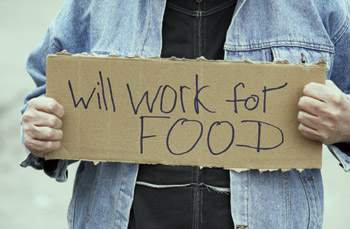Farewell recession, hello depression

The economy is headed over a cliff, unemployment is soaring, the banks are bust, and the government is still in denial. We are about to endure is a 1930s-style depression
7 January 2009
Last month’s quarterly economic commentary from the ESRI forecast the sharpest economic contraction ever in 2009. This came just two days after the release of CSO figures showing a 7.3% drop in retail sales for the year to October. Meanwhile the number of people on the live register soared by 106,000 over the past 12 months, the steepest increase ever recorded. With the economy collapsing all around it, the government’s latest proposals to "revive" the economy and its half-hearted bank recapitalisation scheme are pitifully inadequate.
This combination of the dreadful October retail sales figures, runaway unemployment and the banking crisis means that, following the publication of the ESRI’s updated 2009 forecasts, the recession is officially over. We are now entering a fullscale depression.
Serious shrinkage
In its latest quarterly economic commentary the ESRI forecasts that the economy will shrink by 4.6 % in 2009, unemployment will rise to over 10% of the labour force and 50,000 people will leave the country. If the ESRI has got it right then the economy will shrink by the highest percentage ever recorded next year.
What we are seeing unfold before our eyes is the economic equivalent of a train wreck. We are now entering a period of economic decline unlike anything we have experienced since the early 1930s. If the ESRI’s forecasts are accurate, and all of the available evidence would seem to support its pessimism, then we are in for a 1930-style depression rather than a 1970s or 1980s-style recession. This is serious, very serious.
So what is the government doing about getting us out of this mess? Unfortunately it is now far too late to avoid the coming depression, in fact we are already in its early stages. What is now needed is urgent action to deal with the consequences of the mess we have created for ourselves and to plot a way out of it. We are now paying the price for a decade or more of policy failures.
That’s bad enough but the truly frightening thing is that the government still doesn’t seem to grasp the gravity of the situation. Almost three months on, the banking system still hasn’t been adequately recapitalised. Last month’s €7.5bn bail out of AIB, Bank of Ireland and Anglo Irish doesn’t even come close to fully addressing the problem.
Between them the six Irish-owned banks and building societies have approximately €420bn of loans on their books. An awful lot of those loans are going to go bad, which is why the share prices of the Irish banks have fallen by almost 95% over the past two years.
How much of their loans books will the Irish banks have to write off? The collapse in the market value of the four quoted banks, AIB, Bank of Ireland, Anglo and Irish Life & Permanent, down from a combined peak of over €57bn to just €3bn provides the best guide.
Looking at the numbers
While the €54bn bad debt charge implied by the bank share might seem excessive, look at the numbers. Of the €420bn the Irish-owned banks have lent, €170bn is to builders and property developers, €150bn is residential mortgages and €100bn is everything else.
If the banks end up writing off just 15% of their loans to builders and property developers, 7.5% of their residential mortgages and 10% of their other lending then the total write-off will come to €47bn, quite close to the figure implied by the banks’ falling share prices. What this means is that the €7.5bn of capital injected into the Irish banks last month can only be a first instalment. The final figure will be five or even six times as much.
It is against this background that the government’s inaction is so utterly mystifying. It has still has to repudiate the utterly ridiculous "national" pay deal with the public sector trade unions. We are still waiting for any acknowledgement that current levels of public sector numbers and pay are utterly unsustainable, let alone any proposals to trim this bloated monster.
Applying band-aid measures
In other words, the government is in denial. Instead of tackling the deepening economic crisis head on we have had a series of what can only be characterised as band-aid measures.
It started with the spending "cuts", which were no such thing, last July. Then we had the deposit guarantee scheme that failed to address the banks’ key problem, their lack of capital, in September. October brought the "budget" that had already been overtaken by events when the Finance Minister delivered his speech to the Dail.
Just a few days before the bank bail out package was unveiled the government announced its much-hyped economic "renewal" plan, the centrepiece of which is a €500m fund for start-up businesses. While, unlike many of this government’s other policies, the start-up fund will probably cause no harm and might even do some good, it doesn’t get to grips with the underlying problems. It doesn’t even come close.
Instead it represents a continuation of this government’s refusal to admit to either itself or the Irish people the true extent of the crisis we are now facing. This refusal has long since passed the unwillingness to be confronted with bad news to which all long-standing governments are prone and has become something much more serious; a kind of economic autism.
We are all paying the price for this refusal to confront the new reality. The widening VAT gap with Northern Ireland is destroying the retail sector. The refusal to reform the public sector led to last October’s counter-productive tax increases. The failure to adequately recapitalize the banks means that banks are no longer lending.
So here’s hoping that you enjoyed the recession, the depression will be much worse.



 Print
Print






Fans 0
Followers